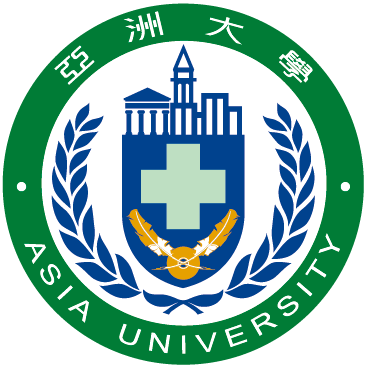Experts and Scholars from 17 Countries Gather to Showcase the Growing Global Momentum of AI Research in Healthcare and Wellness
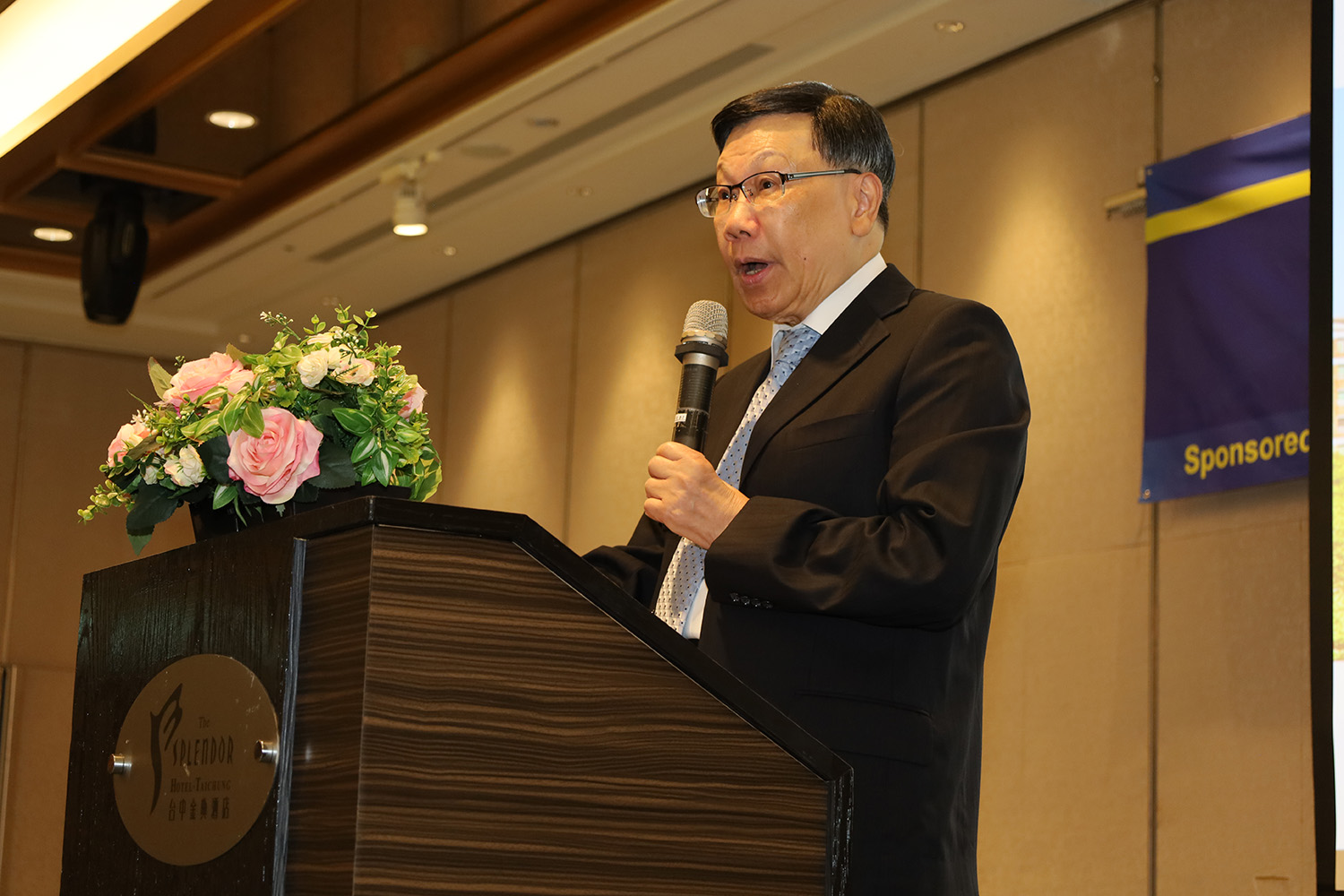 AU President Jeffrey J. P. Tsai stated that the theme of this symposium echoes President Lai’s national vision for a “Healthy Taiwan.”
AU President Jeffrey J. P. Tsai stated that the theme of this symposium echoes President Lai’s national vision for a “Healthy Taiwan.”
Organized by Asia University (AU), with co-sponsorship from the Institute of Electrical and Electronics Engineers (IEEE), the National Science and Technology Council (NSTC), and China Medical University Hospital (CMUH), the 2025 International Conference on Artificial Intelligence × Medicine, Health, and Care (AIxMHC 2025) was held from October 13 to 15 at the Splendor Hotel Taichung and online. The event brought together experts and scholars from 17 countries and regions, reflecting the global enthusiasm and growing focus on AI-driven innovation in healthcare and wellness.
Conference Chair and AU President Jeffrey J. P. Tsai noted that President Lai Ching-te’s “National Project of Hope” envisions transforming Taiwan into a “Smart Technology Island,” with the NSTC advancing strategic industries such as semiconductors, artificial intelligence, telecommunications, and smart healthcare. This symposium echoes that national vision by integrating global research expertise, fostering cross-disciplinary collaboration, and exploring how AI can lead the next era of health and care innovation.
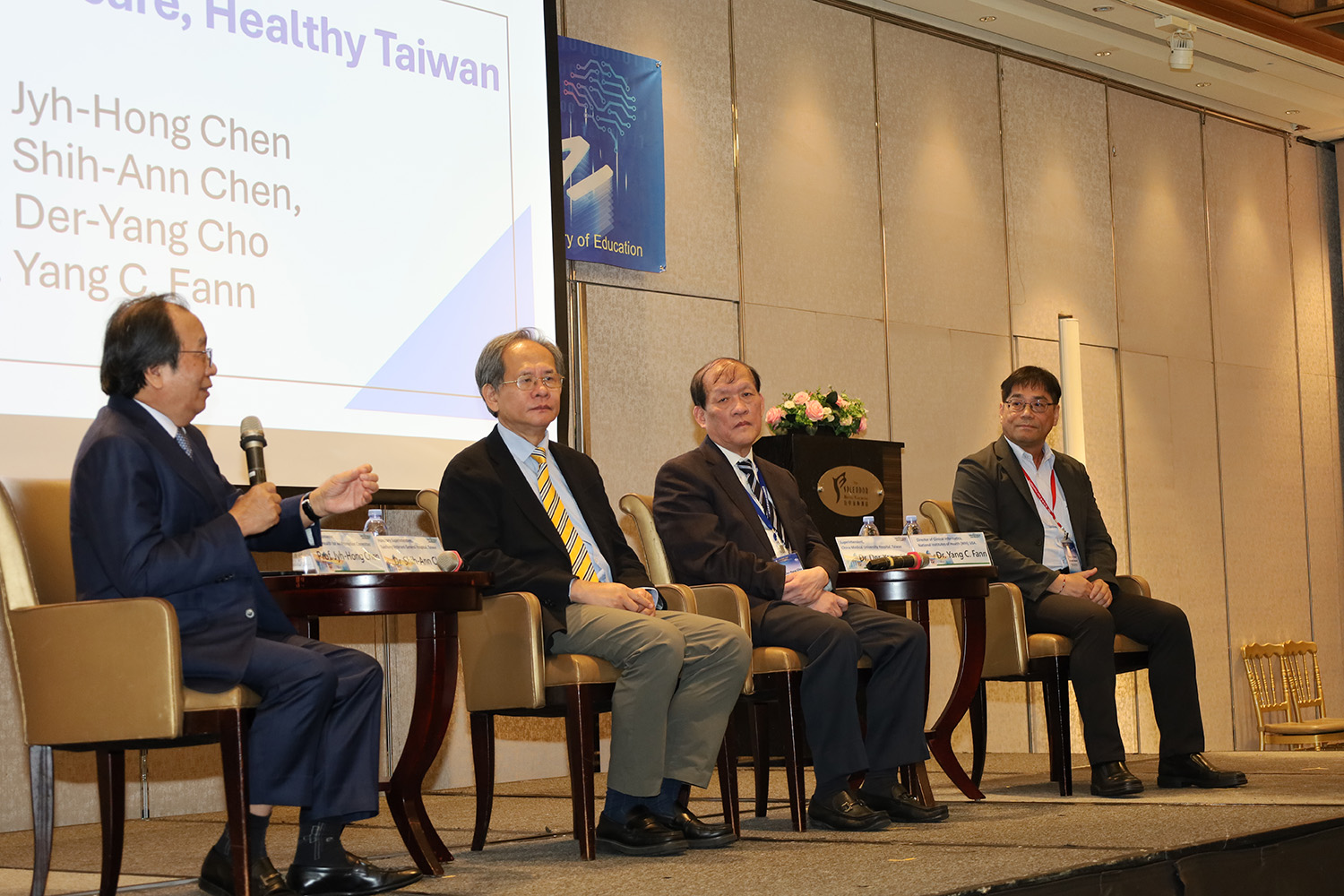 One of the highlights of the conference was a distinguished panel discussion moderated by Professor Chih-Hung Chen, Deputy Convener of the “Healthy Taiwan” Promotion Committee. The panel featured Dr. Shih-An Chen, Honorary Superintendent of Taichung Veterans General Hospital; Professor Te-Yang Chou, Dean of China Medical University; and Dr. Yang Zheng Fan, Director of the Clinical Informatics Department at the U.S. National Institutes of Health (NIH), who participated in a personal capacity.
One of the highlights of the conference was a distinguished panel discussion moderated by Professor Chih-Hung Chen, Deputy Convener of the “Healthy Taiwan” Promotion Committee. The panel featured Dr. Shih-An Chen, Honorary Superintendent of Taichung Veterans General Hospital; Professor Te-Yang Chou, Dean of China Medical University; and Dr. Yang Zheng Fan, Director of the Clinical Informatics Department at the U.S. National Institutes of Health (NIH), who participated in a personal capacity.
In his opening remarks, President Tsai Chin-fa of Asia University emphasized that artificial intelligence is fundamentally transforming every aspect of medicine and health sciences—from precision diagnosis and personalized treatment to predictive analytics and intelligent decision support. AI, he noted, is redefining the way diseases are prevented, extending beyond clinical medicine to inspire new ways of using technology to support mental well-being and enhance overall happiness.
One of the conference highlights was the special forum titled “Smart Healthcare for a Healthy Taiwan,” moderated by Professor Chih-Hung Chen, Deputy Convener of the Healthy Taiwan Promotion Committee. The panel featured Dr. Shih-An Chen, Honorary Superintendent of Taichung Veterans General Hospital; Professor Te-Yang Chou, Dean of China Medical University; and Dr. Yang Zheng Fan, Director of the Clinical Informatics Department at the U.S. National Institutes of Health (NIH), who participated in a personal capacity. Together, they explored the implementation and future prospects of smart healthcare in Taiwan—from clinical applications to public health policy—offering deep insights into how AI technologies can enable more human-centered and compassionate care for all.
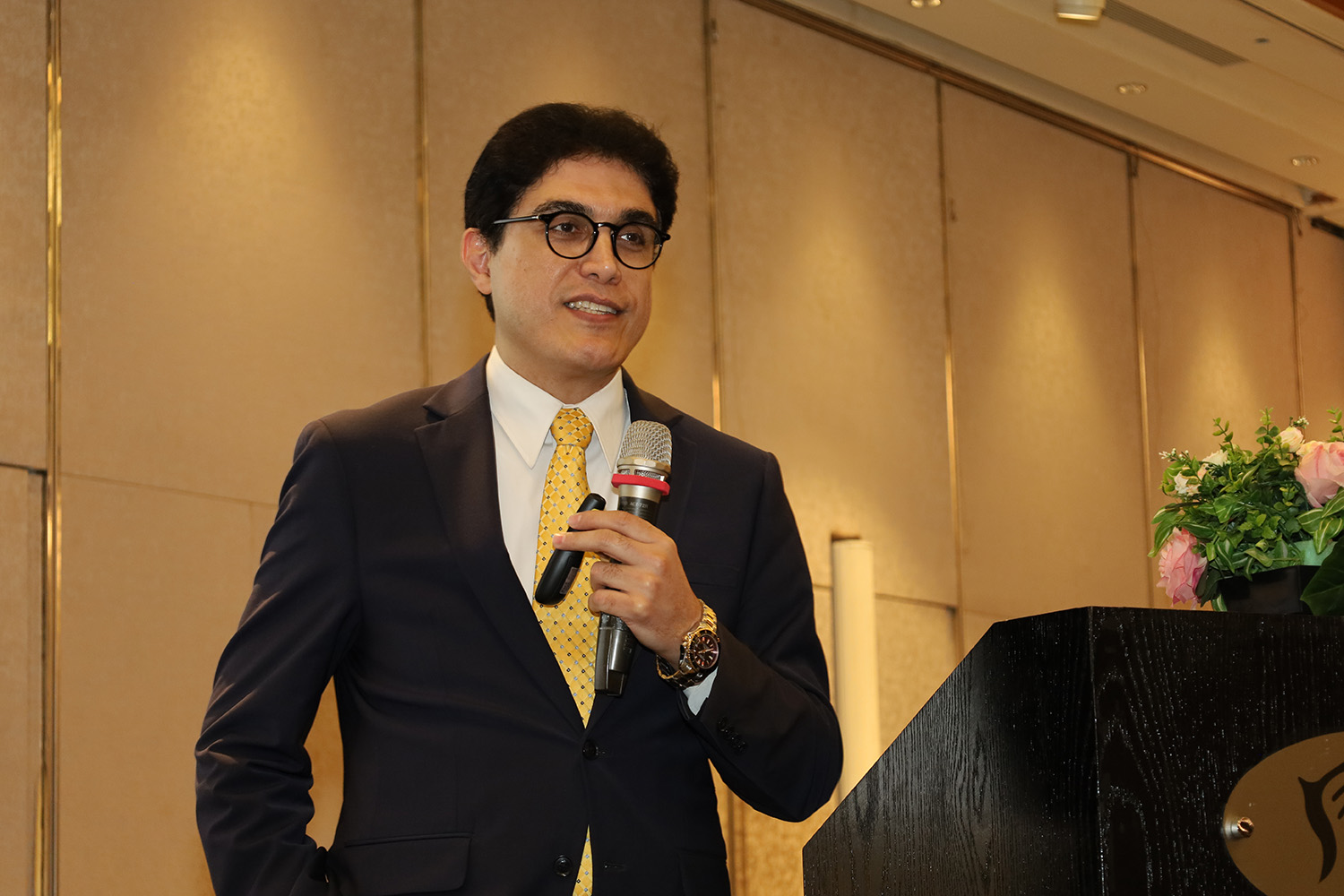 Professor Alireza Haghighi of Harvard Medical School provided an in-depth analysis of how AI integrates with genomics to propel precision medicine into a new phase.
Professor Alireza Haghighi of Harvard Medical School provided an in-depth analysis of how AI integrates with genomics to propel precision medicine into a new phase.
In response to President Lai Ching-te’s National Day address, titled “A New Taiwan Rising Amid Global Change,” which emphasized the “Healthy Taiwan Deep Cultivation Plan” aimed at providing higher-quality healthcare services for all citizens, Professor Chih-Hung Chen, Convener of the Healthy Taiwan Promotion Alliance and former Superintendent of National Cheng Kung University Hospital, stated that the initiative will strengthen regional health defense strategies, implement vertically integrated tiered healthcare, optimize working conditions for medical professionals, enhance their core values, and introduce technology to improve medical efficiency—ultimately building an intelligent, green, and resilient sustainable healthcare system.
Honorary Superintendent Shih-An Chen discussed the applications of AI in medicine, which can be categorized into health economics, telemedicine and home health care, precision medicine, and predictive and preventive medicine. In cardiology, AI can be applied in cardiovascular imaging, electrophysiology, and interventional cardiology. From a commercial perspective, he noted that the successful implementation of AI technologies depends greatly on product design, with wearable devices being the most prevalent today. Through AI model training, these devices can serve as powerful predictive tools for early disease detection and management.
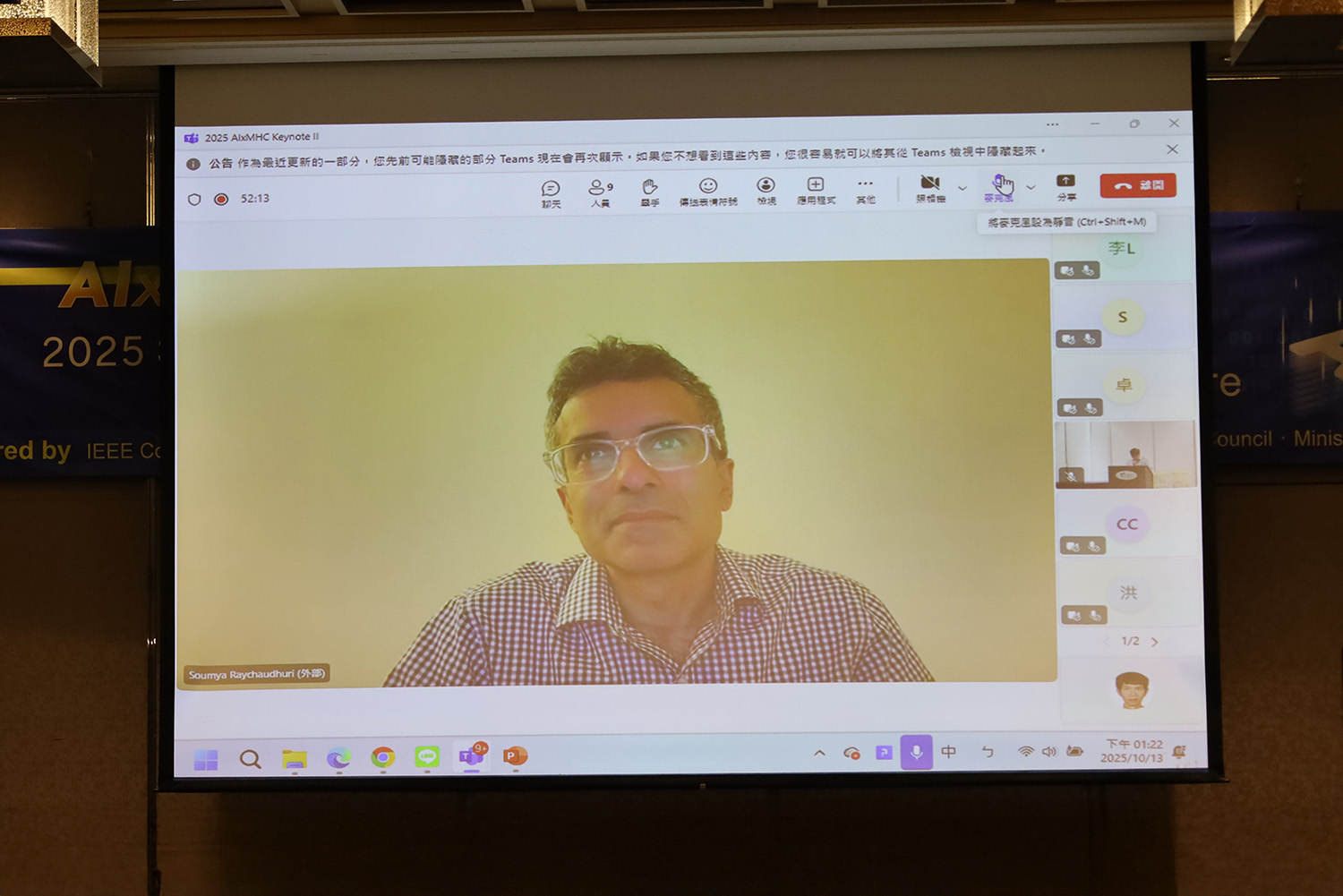 Professor Soumya Raychaudhuri from Harvard Medical School delivered an online keynote lecture titled “Using Large-Scale Genetic Data to Decode the Immune Mechanisms of Autoimmune Diseases.”
Professor Soumya Raychaudhuri from Harvard Medical School delivered an online keynote lecture titled “Using Large-Scale Genetic Data to Decode the Immune Mechanisms of Autoimmune Diseases.”
President Chou Te-Yang of China Medical University shared that under his leadership, the university has actively integrated AI and big data into clinical workflows, including AI-assisted diagnosis, intelligent medical record generation, and nursing documentation optimization. These applications have significantly improved both efficiency and accuracy in healthcare delivery, earning China Medical University the “Medical Technology Contribution Award.” He emphasized that AI and data analytics have become core tools for refining medical decision-making and management—enabling more precise diagnostics, enhancing treatment outcomes, shortening patient wait times, and ultimately delivering safer, faster, and more personalized medical care.
Professor Yang-Cheng Fan from the U.S. National Institutes of Health (NIH) noted that the rise of intelligent healthcare is reshaping human life. Future health management, he predicted, will evolve toward “self-directed decision-making,” where individuals make informed health choices rather than solely relying on medical personnel. Hospitals will increasingly move toward virtualization—allowing AI to provide real-time information, creating an experience akin to “having a doctor by your side.” He added that telemedicine and community-based healthcare systems will continue to grow in importance.
The conference opened with several high-impact keynote sessions. Dr. Alireza Haghighi, Professor at Harvard Medical School, presented “Genomics and Artificial Intelligence: Transforming the Future of Precision Medicine,” analyzing how AI and genomics are converging to advance next-generation healthcare. He explained that the rise of next-generation sequencing (NGS) and large-scale biobanks allows AI to process vast and complex multi-omics data, uncovering molecular mechanisms and genetic risks underlying diseases. Dr. Haghighi shared international case studies showing how AI can improve disease prediction models, personalize treatment design, and accelerate drug discovery—moving closer to the vision of “one patient, one medicine.” He also cautioned that as AI becomes increasingly integrated into clinical practice, challenges surrounding data privacy, ethics, and international regulation must be carefully addressed.
Following him, Professor Soumya Raychaudhuri of Harvard Medical School delivered a keynote titled “Using Large-Scale Genetic Data to Decode the Immune Mechanisms of Autoimmune Diseases.” Using rheumatoid arthritis as a case study, he demonstrated how his team combines AI with single-cell RNA sequencing (scRNA-seq), ATAC-seq, and genome editing to achieve groundbreaking insights. Through integrated data analysis and AI modeling, the team has identified over 150 disease-associated genetic loci and revealed key translational pathways in immune cell inflammation. Professor Raychaudhuri emphasized that AI enables researchers to understand immune mechanisms at the cellular level—paving the way for personalized immunotherapy and marking a major milestone in decoding complex biological systems.
Professor Chih-Wei Chang of Stanford University presented “From Generative AI to Artificial General Intelligence (AGI): Opportunities of Multi-Agent Collaboration in Healthcare.” He traced the evolution of large language models (LLMs) from task-oriented systems to generative AI and proposed that true AGI could emerge through multi-model, multi-agent collaboration. Using clinical decision support as an example, Professor Chang illustrated how specialized AI agents can cooperate across domains—diagnosis, drug response prediction, and multimodal data integration—to create intelligent systems capable of memory, reasoning, and cross-disciplinary learning. He argued that such architectures could enhance the reliability and ethical governance of medical AI, paving the way toward safe and trustworthy AGI in healthcare.
Conference Program Chair Dean Hsu Ching-Hsien concluded that AIxMHC 2025 serves not only as a leading international academic event but also as a bridge between technology and humanity. He expressed hope that the symposium would inspire new forms of interdisciplinary collaboration and innovative thinking, positioning AI not merely as a driver of medical technology but as a transformative force for human health and well-being.
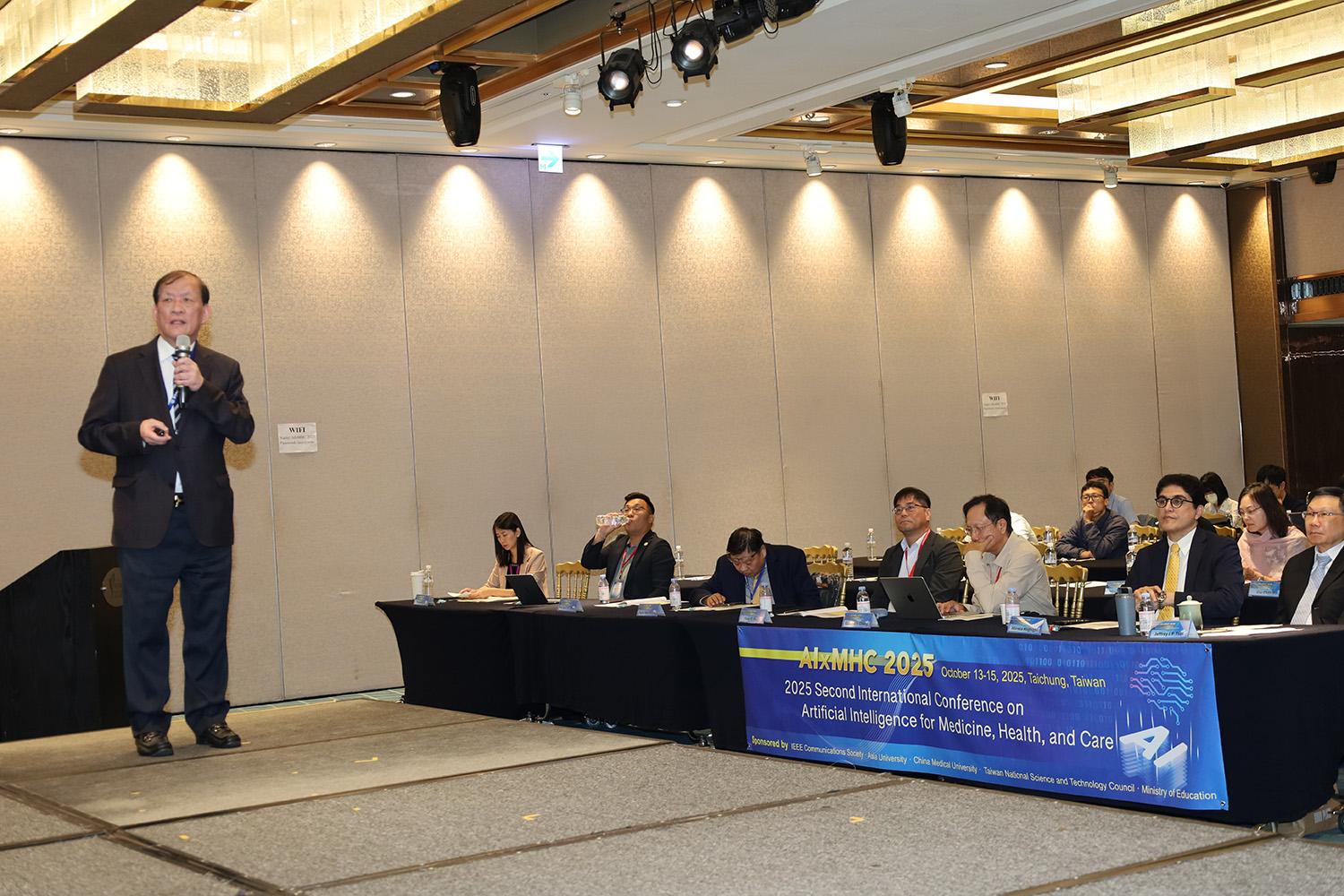
China Medical University President Chou Te-Yang shared that the university has deeply integrated AI and big data analytics to evaluate and optimize medical decision-making and healthcare management.
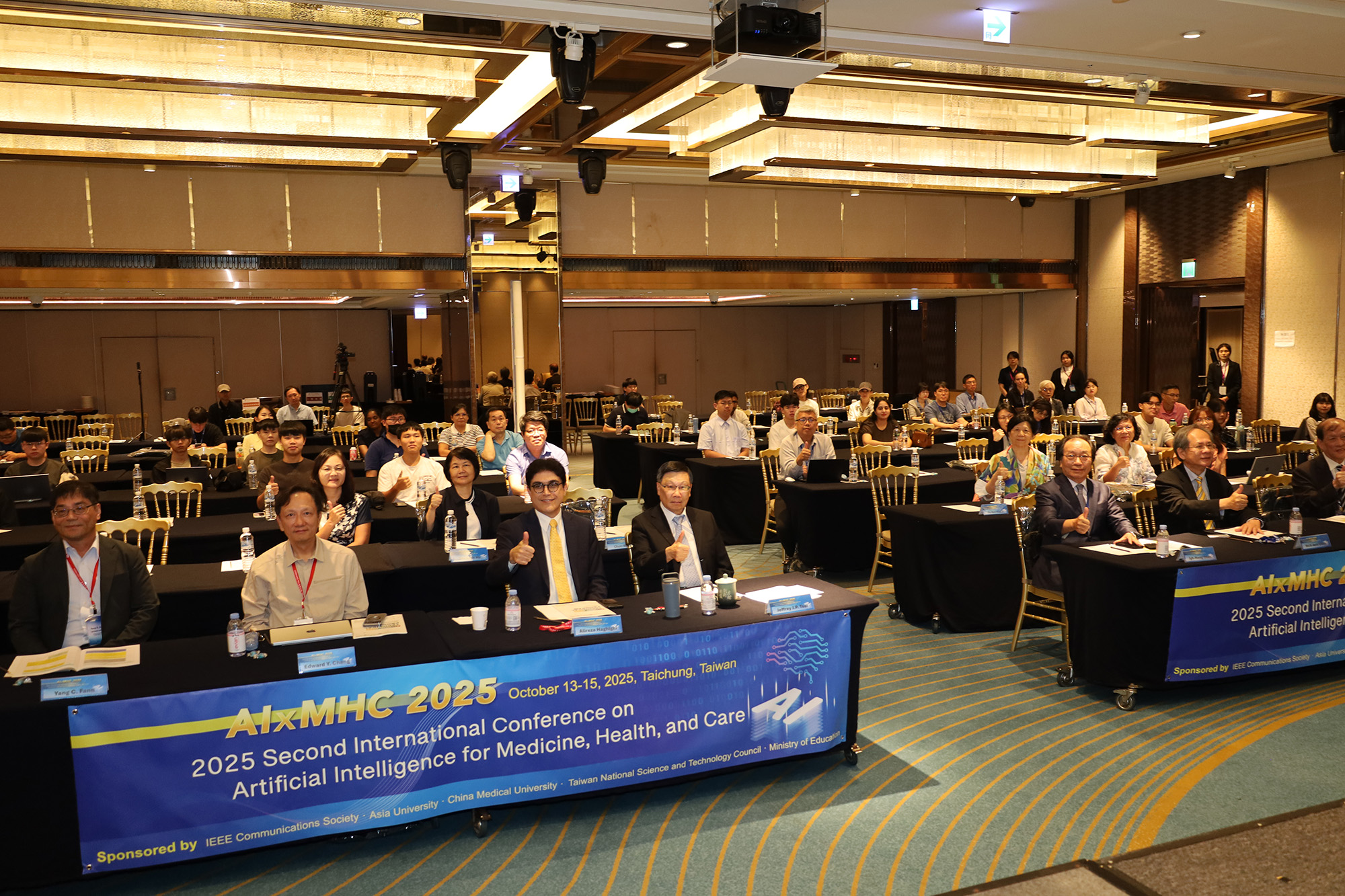
AU President Tsai Chin-Fa (4th left), Harvard Medical School Professor Dr. Alireza Haghighi (3th left), Stanford University Visiting Professor Dr. Chih-Wei Chang (2rd left), and NIH Clinical Informatics Director Dr. Yang-Cheng Fan, along with participating experts and scholars, pose for a group photo.
